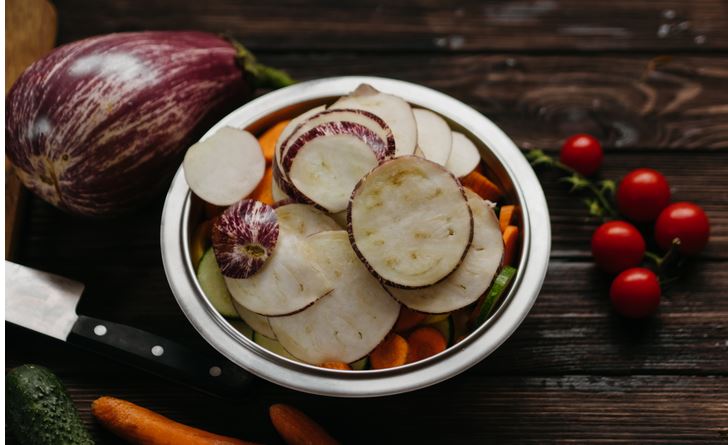Guide to Plant-Based Diets: Tips, Benefits, and Recipes

Recently, more people have realized the advantages of consuming plant-based foods for their health and the environment, which has led to the increasing popularity of plant-based diets.
Consider a plant-based diet if you want a healthy and natural one. This diet includes fresh fruits, vegetables, grains, legumes, nuts, and minimally processed seeds.
Beginner's Guide to Plant-Based Diets: Tips, Benefits, and Recipes
Our beginner guide will cover all the information you need, such as the benefits of plant-based diets, the different types available, tips for starting, and even some meal ideas to try.
Section 1: Benefits of a Plant-Based Diet
A plant-based diet offers numerous benefits for both your health and the environment. Here are some of the main benefits:
1. Health Benefits
Opting for a plant-based diet is an effective measure to decrease the likelihood of developing chronic illnesses.
Eating a nutritionally sound diet has been linked to reduced risks of heart disease, type 2 diabetes, and specific types of cancer. This kind of eating plan provides multiple benefits for those who follow it.
Eating plant-based foods has many excellent health benefits, so it's becoming increasingly popular. People recognize the value of such diets and change their lifestyles accordingly.
2. Environmental Benefits
The animal agriculture industry directly affects the environment, resulting in higher greenhouse gas emissions, deforestation rates, and water pollution.
As people gain more knowledge about the environmental effects of their eating habits, plant-based diets are becoming increasingly popular. This diet shift helps minimize the ecosystem damage caused by certain foods.
Limiting our consumption of animal products and increasing the intake of plant-based cuisines can significantly reduce our carbon footprint and promote sustainability.
3. Animal Welfare
With the increasing awareness of the ethical ramifications of consuming animal products, plant-based diets are becoming increasingly popular. Plant-based diets reduce the demand for factory-farmed animals, benefit human health, and have a significantly lower environmental impact than their meat-based counterparts.
By eating a plant-based diet, we can all contribute positively to animal welfare and health.
Section 2: Types of Plant-Based Diets
There are several types of plant-based diets, each with varying levels of restriction:
1. Vegan Diet
Eating a diet mindful of animal products has become increasingly popular recently. People are following this trend to be more socially responsible and ethical.
An individual following a vegan lifestyle can abstain from all animal products, such as meat, dairy, eggs, and honey. It is gaining popularity due to its numerous health benefits and potential to help reduce the environmental impacts of factory farming.
Eating vegan can be challenging at first as it requires understanding plant-based nutrition and a willingness to explore new foods.
However, with suitable recipes and meal-planning strategies, anyone can enjoy the healthful benefits of a vegan diet.
2. Vegetarian Diet
A vegetarian diet is a lifestyle choice that eliminates consuming animal products, including meat, poultry, and fish. Instead, vegetarians eat plant-based foods such as fruits, vegetables, legumes, and grains.
As health benefits and environmental concerns become more and more prominent, there has been a shift away from traditional diets to this one in the recent past.
As part of a vegetarian diet, one can consume dairy products like cheese, eggs, and honey. This diet has gained immense popularity due to its potential health advantages and ability to reduce an individual's carbon footprint.
3. Flexitarian Diet
Flexitarianism is an excellent dietary option for those who want to reap the benefits of plant-based eating but still include some animal products.
It's an easy and flexible way to get the health advantages of a vegan diet without completely removing meat from your meals.
Incorporating more plant-based meals and treating yourself to the occasional meat meal is an excellent way to experience the health benefits of veganism without the need to make it an absolute lifestyle.
This diet also allows people to be more flexible with their dietary choices and could benefit anyone looking to make healthier eating decisions.
4. Pescatarian Diet
A pescatarian diet is a healthy way to get essential nutrients while maintaining a plant-based lifestyle. It focuses on eating fish, seafood, and other plant-based foods like fruits, vegetables, nuts, and grains.
Omega-3 fatty acids are prevalent in this diet and can be beneficial in reducing inflammation and safeguarding the heart from disease.
Additionally, it helps promote sustainable fishing practices and reduce the environmental impact of animal agriculture. Pescatarians may also enjoy the variety of flavors and textures that come with including fish in their meals.
5. Plant-Based Whole Foods Diet
A plant-based whole foods diet is becoming increasingly popular as people recognize its health benefits.
This regime emphasizes the consumption of natural, unmodified produce from plants like fruits, vegetables, cereals, legumes, nuts, and seeds. It can help improve overall health by providing essential nutrients and reducing the risk of chronic diseases.
Additionally, it can help promote sustainable living by avoiding animal products and reducing environmental impact.
Section 3: Getting Started with a Plant-Based Diet
If you're new to plant-based eating, here are some tips to help you get started:
1. Start Slow
Plant-based diets have gained traction in recent years and for many good reasons. Not only does it promote a healthier lifestyle, but it can also help to reduce the environmental footprint. But switching overnight can be uncomfortable, especially if you're from a background of eating animal products.
The best way to transition into a plant-based diet is to start gradually. Incorporate more plant-based foods into your meals, such as fruits, veggies, whole grains, legumes, nuts, and seeds.
As you become more comfortable with these foods, gradually reduce your meat and other animal product intake. To get started, try incorporating one new plant-based food into your diet each week
2. Learn New Recipes
Plant-based recipes are a great way to get creative in the kitchen. By exploring new recipes that use plant-based ingredients, you can find new and delicious ways to incorporate more nutritious and sustainable elements into your meals.
With a wealth of online resources, such as recipe blogs, YouTube channels, and cookbooks, it's easy to find inspiring plant-based recipes with vibrant flavors and textures. Try experimenting with different ingredients to create tasty, nutritious, and satisfying dishes!
3. Make it a Habit
A plant-based diet is one of the best ways to nourish your body and improve overall health. Eating various fruits and vegetables as part of your diet can help you achieve a balanced nutritional intake.
Eating these foods can help you get the necessary vitamins, minerals, and nutrients to stay healthy. They provide a solid foundation for having a balanced diet.
Whether you have a plant-based lunch daily or add more fruits and vegetables to your snacks, taking small steps toward eating better will have long-term benefits.
4. Get Support
Eating a plant-based diet can be challenging, but it doesn't have to be. Joining a plant-based eating group or finding a plant-based eating partner can make the journey more accessible and enjoyable.
With the support of others, you will have access to delicious recipes, tips, and tricks that will help you stick to your diet and stay motivated.
Section 4: Meal Ideas for a Plant-Based Diet
Here are some meal ideas to help you get started
1. Breakfast Ideas:
· Overnight oats with berries and nuts
Overnight oats make for a delicious and nutritious breakfast option. They can be prepared with minimal effort and don't need any cooking, making them the perfect meal for busy mornings.
Combine rolled oats, your favorite berries and nuts, and some milk of choice in a jar or container and leave it in the fridge overnight. The following day you will have a delicious bowl of overnight oats with berries and nuts ready to enjoy!
· Tofu scramble with spinach and whole-grain toast
Kickstart your day with the mouth-watering flavor of a tofu scramble breakfast! Not just delicious but also packed with nutrition to keep you energized. It's a great way to fuel your body with the energy it needs for the day ahead. It will give you the power and nutrients to fuel your day.
This vegan-friendly meal is packed with protein and fiber from the tofu, spinach, and whole-grain toast. It's not only quick and easy to prepare this meal, but it is also enriched with vitamins and minerals that can help you to maintain your energy levels during the day. The perfect combination of flavors will have your taste buds dancing!
· Smoothie bowl with banana, frozen berries, and almond milk
Kickstart your day with a satisfying and healthy smoothie bowl. Enjoy the unique combination of flavors and reap the health benefits from its many nutritious ingredients.
This breakfast option is easy to make and packed with nutrition and flavor. Whether you're looking for an energizing pre-workout snack or a healthy way to satisfy your sweet tooth cravings, this smoothie bowl has you covered! It has been created with fresh bananas, frozen berries, and almond milk.
2. Lunch Ideas:
· Roasted vegetable wrap with hummus and avocado
Enjoy a light yet tasty lunch with this roasted vegetable wrap. The roasted vegetables, creamy hummus, and delicious avocado are flavorful. This wrap perfectly balances nutrition and taste and will satisfy and energize you!
· Quinoa salad with roasted vegetables and chickpeas
This delicious quinoa salad is packed with flavor and nutrition. It's made with roasted vegetables, chickpeas, and quinoa tossed in a light vinaigrette dressing.
The texture of the roasted vegetables, combined with the nutty flavor of the quinoa, makes this dish a satisfying meal any day of the week. It's also easily adaptable to whatever veggies you have on hand for a unique twist every time.
· Lentil soup with whole-grain bread
Lentil soup is an excellent choice for dinner! This product contains the necessary elements. It's delicious and packed with health benefits.
When paired with whole-grain bread, it makes a perfect lunch or dinner option that is hearty and healthy. Lentil soup can be delicious and nutritious if you add the correct spices and vegetables. This tasty variation of the classic soup can please even the pickiest eaters.
3. Dinner Ideas:
· Mushroom and lentil bolognese with whole-grain pasta
If you're looking for a healthy, delicious, and vegetarian meal that is easy to make and flavorful, try this Mushroom and Lentil Bolognese with Whole-Grain Pasta.
This recipe combines the savory flavors of mushrooms and lentils with the nutty taste of whole-grain pasta for a fantastic combination. Make sure to have this recipe at your next dinner gathering - it will be a hit!
· Cauliflower rice stir-fried with tofu and vegetables
If you're looking for something nutritious and tasty, this is the perfect meal to satisfy even the choosiest diners!
This cauliflower rice stir-fry with tofu and vegetables is a light and flavorful dish that comes together in minutes. This meal is filled with protein, vitamins, minerals, and fiber from the vegetables, making it a great choice to add to your regular meal rotation.
· Craving for something tasty and healthy? Try sweet potato and black bean tacos with a dash of avocado and salsa. You'll love how delectable these tacos are!
With sweet potato and black beans as the base, these tacos are packed with flavor and nutrition. Top them off with creamy avocado and your favorite salsa for an extra kick of flavor. Enjoy a quick and easy meal that's sure to please any palate!
4. Snack Ideas:
· Apple slices with almond butter
Apple slices with almond butter are a nutritious and delicious snack that is satisfying and easy to make. This nutritious meal contains the perfect blend of protein, carbs, and healthy fats to maintain your energy levels for the whole day.
Furthermore, its preparation is effortless and takes little time. The combination of crunchy apples, creamy almond butter, and a hint of sweetness make this snack a healthy and tasty treat.
· Carrots and celery sticks with hummus
Carrots and celery sticks with hummus are a light, healthy snack option packed with flavor. This easy-to-make snack is high in fiber and protein while still low in calories, making it an excellent way to satisfy hunger without compromising nutrition. Plus, adding a delicious hummus dip to the mix makes it even more satisfying and adds a touch of creaminess.
· Roasted chickpeas with spices
Roasted chickpeas are a convenient, delicious, and healthy snack option. They are packed with protein and fiber to keep you full, while their mild flavor allows for endless variations.
Roasted chickpeas can be transformed into a delicious snack with simple spices. This tasty treat can provide you with an excellent flavor hit. Plus, it's an ideal way of satisfying all those pesky cravings!
Section 5: Common Challenges with a Plant-Based Diet
People may face some common challenges when transitioning to a plant-based diet. Here are some tips to help overcome these challenges:
1. Getting Enough Protein
Protein is essential for good health, and it's no surprise that many people worry about getting enough of it on a plant-based diet.
Fortunately, plenty of plant-based protein sources can provide the nutrition for a healthy lifestyle. Beans, lentils, nuts, seeds, and quinoa are delicious protein sources for those who choose a plant-based diet.
However, there are many plant-based protein sources, such as tofu, tempeh, legumes, nuts, and seeds. It's essential to include various foods in your diet to ensure you're getting enough protein.
2. Getting Enough Iron and Vitamin B12
Iron and vitamin B12 are two essential nutrients primarily found in animal products. They're important for maintaining a healthy body and mind, but their availability from plant-based sources is limited.
However, there are plant-based sources of these nutrients, such as fortified cereals, tofu, and nutritional yeast. If you're concerned about getting enough of these nutrients, consider taking a supplement or talking to a registered dietitian.
3. Social Situations
Eating plant-based can be especially difficult when dining out or attending social events. Navigating a menu of primarily animal-based products, trying to find something you can eat without offending anyone, and dealing with the judgment of others around you can be overwhelming.
Fortunately, there are ways to make plant-based eating easier in social situations. Enjoying a delicious meal without compromising your dietary choices is possible with some planning and preparation.
However, plant-based options are often available, or you can bring your dish to share. It's also helpful to communicate with others about your dietary preferences and explain why you chose a plant-based diet.
Section 6: Conclusion
A plant-based diet is a healthy and sustainable way of eating that offers numerous benefits for your health and the environment.
Be bold and start small if you're curious about transitioning to a plant-based diet. Introduce more plant-based foods into your diet at a comfortable pace, and try out new recipes if you can.
Remember to get enough protein, iron, and vitamin B12 and to seek Support from others who share your dietary preferences. With time and practice, you'll discover that eating a plant-based diet can be enjoyable, delicious, and fulfilling.




